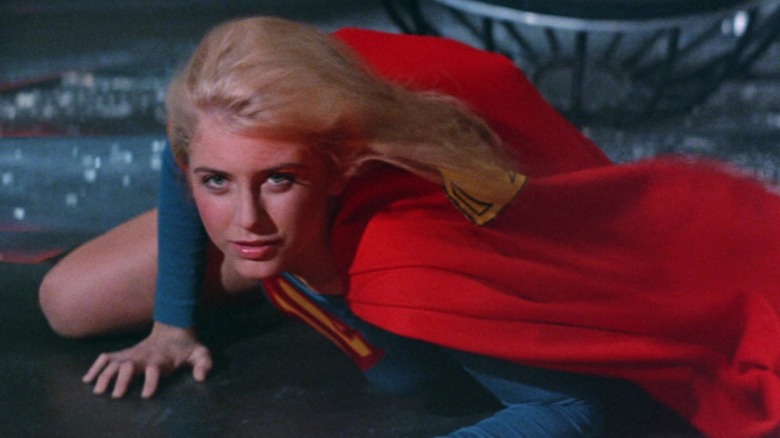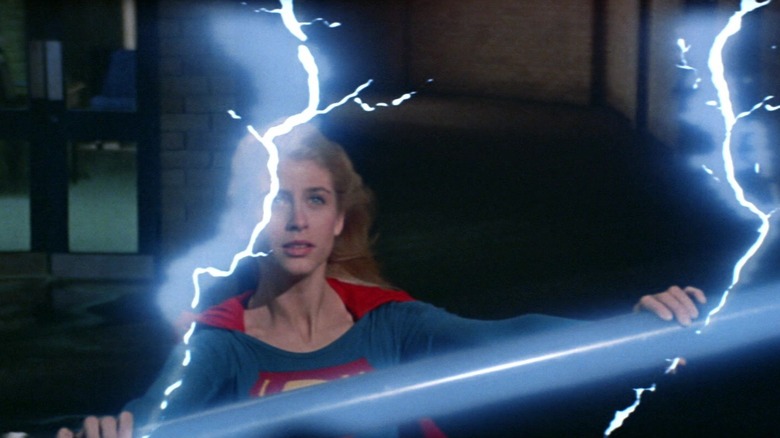Why Christopher Reeve Didn't Cameo As Superman In The '80s Supergirl Movie
Jeannot Szwarc's 1984 film "Supergirl" is plenty notorious to this day. It came after the somewhat notable success of Richard Lester's 1983 comedy "Superman III" — a film that made over $80 million on a rather sizable $39 million budget — and hoped to ride the popularity of Christopher Reeve's version of the character to its own financial success. The film, however, was so weird and campy, and so badly written, that audiences stayed away. "Supergirl" had an impressive $35 million budget of its own, but only earned back $14 million at the box office. Modern critics — like myself — may argue that "Supergirl" is entertaining in its own way, sporting a gloriously over-the-top performance from Faye Dunaway as the movie's witchy villain, Selena.
Lovers of camp may also marvel at the film's weird structure, wherein the title heroine takes a long, long time away from her central mission to enroll in an all-girls boarding school. Supergirl (Helen Slater) escapes from her Kryptonian home of Argo City (isolated in its own pocket dimension) to retrieve the lost Omegahedron, a magical billiard-ball-sized widget that powers Argo and keeps it alive. Selena finds it, however, and (somehow) immediately intuits she can use it to become a powerful sorceress. Supergirl, Superman's cousin, seems easily distracted, however, and loses sight of her quest to book a dorm room, make friends, and get a crush on Hart Bochner.
The only common character between the "Superman" movies and "Supergirl" is Jimmy Olsen, played by Marc McClure. One might think that Reeve would appear to give the new movie his blessing, but the actor turned down the opportunity. This was stated explicitly in the 2006 documentary film "You Will Believe: The Cinematic Saga of Superman."
What Supergirl was supposed to have been
In an early draft of the "Supergirl" script, Superman was supposed to play a major part in the story. The idea was that Supergirl would arrive on Earth, and Superman would appear to become her mentor, teaching her in the ways of superherodom. Christopher Reeve declined to appear in "Supergirl," however, feeling that he was ready to retire the role and move on to other projects. Reeve did eventually appear in 1987's "Superman IV: The Quest for Peace," but only after he was allowed to pitch the film's story; he wanted to make a Superman film about nuclear disarmament. Before that, Reeve was kind of done with playing Superman. It didn't help that "Superman III" got very negative reviews.
For the record, "Superman IV" wasn't very well-received either, suffering from a rushed script and a painfully low budget (the film was overseen by the notorious B-grade Cannon Group). Thereafter, Reeve would say at pop culture conventions that he would only want to play Superman if he had a good script and the budget was right.
So "Supergirl" was kind of out of the picture for him. Szwarc wishes Reeve had been a part, as it would have lent some credibility to everything. To explain Superman's absence in "Supergirl," there are some cursory lines of dialogue about how he has left the planet on some ill-defined peace-keeping mission. This would leave Supergirl to defend Earth all on her own from Selena and her magic. The film was such a bomb, it not only stymied any further sequels to feature the character, but became the default evidence that superhero movies with female leads wouldn't ever succeed.
It would take 42 years before another "Supergirl" movie was made; Craig Gillespie's "Supergirl: Woman of Tomorrow" is due in theaters on June 26, 2026.

